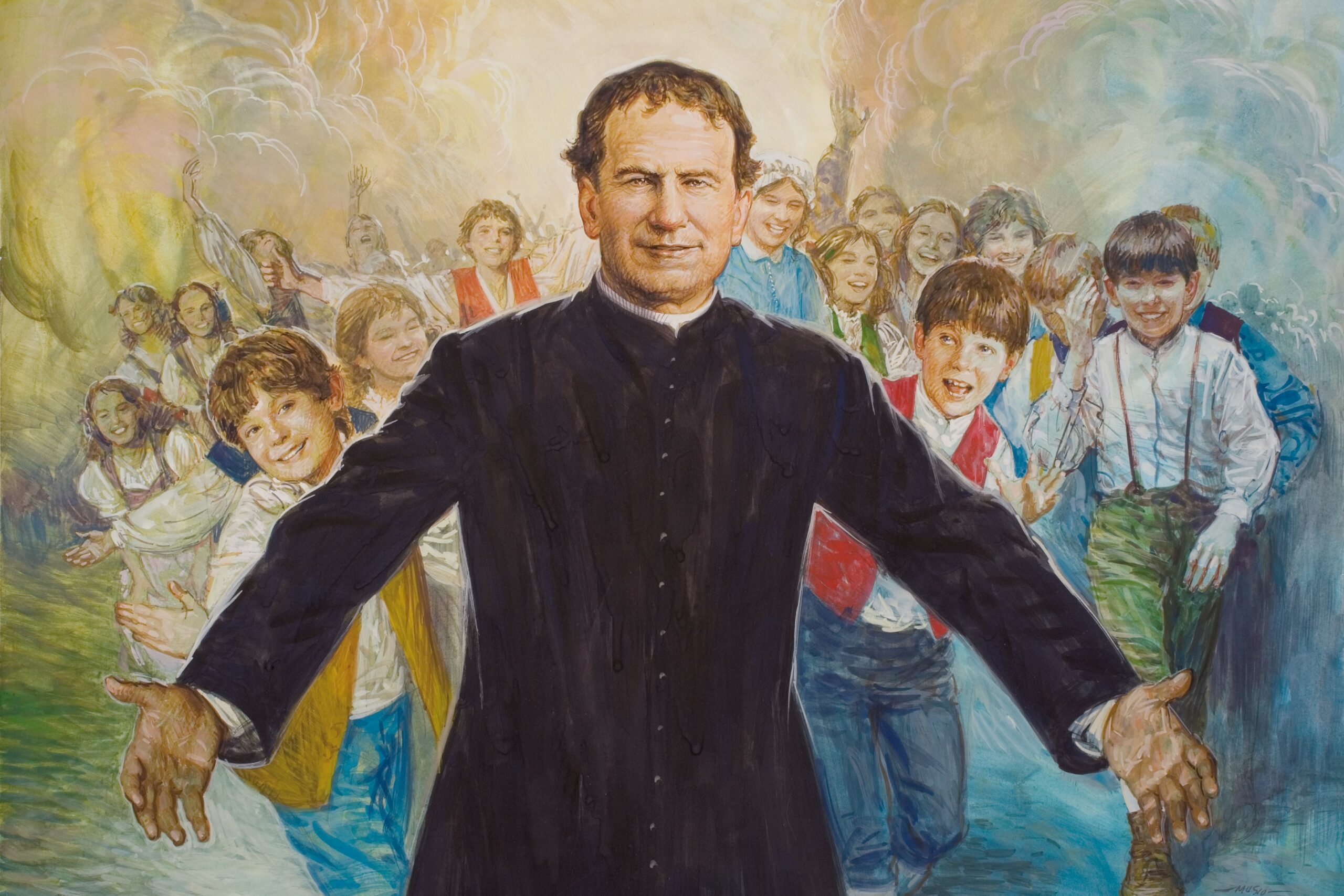
Saint Of The Day For January 31: Saint John Bosco
Founder of the Salesians and the Daughters of Mary Help of Christians, John Bosco is the saint of young people. Canonised in 1934, at the close of the Year of the Redemption, he is commemorated on 31 January.
Patron saint of educators, young people, students and publishers.
The premonitory dream of John Bosco
The fire of charity that animated the priest was a desire to love the Almighty in those he met.
‘Da mihi animas, coetera tolle’, ‘give me souls, take all the rest’ was the motto that hung in his bedroom.
Premonitory was a dream he received when he was just nine years old: he was surrounded by swearing boys.
Impulsive in temperament, he attacked them with fists and kicks to make them stop, but first Jesus and then the Virgin Mary appeared to him, inviting him to win these ‘friends’ ‘not with beatings, but with meekness and charity’: only in this way would he teach them ‘the ugliness of sin and the preciousness of virtue’.
John Bosco, born into a poor family, but gifted with great intelligence
He was born on 16 August 1815 to peasants in the Becchi, a hamlet of Castelnuovo d’Asti.
When his father, Francesco, who had married Margherita Occhiena in his second marriage, died at the age of thirty-three from pneumonia, he was just two years old.
For the family, the road was all uphill: Giovannino’s marked intelligence, which had already emerged at an early age, immediately met with hostility from his half-brother Antonio, who considered time wasted on books.
The latter’s bullying forced his mother Margherita to send Giovannino away from home, finding him work as an apprentice at the Moglia farmstead.
He had recently received his First Communion, but was already attracting many children of his age around him by talking to them about Jesus in the captivating language of games and acrobatics, learned from fairground acrobats.
The boy’s intellectual liveliness did not escape the notice of the chaplain of Morialdo, Fr Giovanni Calosso, in 1829, who gave him his first Latin lessons before his sudden death.
It was only in 1831, however, that Giovanni was able to resume his studies, completing elementary and grammar school in four years.
To pay for his lessons, he worked as a tailor, waiter, stable boy, carpenter, shoemaker and blacksmith.
A meritorious student with an astonishing memory, he soon came to the attention of St Joseph Cafasso, a priest who directed him to the seminary.
He was ordained priest on 5 June 1841 in the Chapel of the Archbishopric in Turin.
After moving to the Ecclesiastical Boarding School in the Savoy city, he began his apostolate in the nearby Church of St Francis of Assisi among the poorest young people, whom he met in the streets, building sites and prisons, often from the countryside, disoriented by the process of industrialisation.
The Oratory and the passion for young people
On 8 December 1844, inspired by St Philip Neri, he founded, naming it after St Francis de Sales, the oratory that he would later establish at Valdocco.
Soon afterwards Don Bosco would also give life to the Salesian Congregation at the service of youth, and later, in 1872, together with St. Maria Domenica Mazzarello, to the Institute of the Daughters of Mary Help of Christians for the education of young women.
Soon the Salesian mission took on an international character: the Salesian Bulletin, today distributed in 26 languages and 135 countries, and the saint’s hagiographic and pedagogical texts, always inspired by a preventive and never repressive educational approach, were immediately translated into several languages while he was still alive.
The priest was a convinced promoter of the ‘good Catholic press’ aimed at countering the harmful effects of the ‘bad’ one, a vehicle for lies and heresy.
John Bosco, Forming honest citizens and good Christians
So much spiritual, pastoral and social Catholic commitment combined with unconditional loyalty to the Pope, at the time of the liberal and Masonic government, could only bring the founder of the Salesians enmity, persecution and attacks.
However, such was the esteem he earned in public opinion for his educational work that on more than one occasion he was chosen as mediator between the State and the Holy See.
The Sacred Heart Church in Rome, built at the invitation of Pope Leo XIII and realised with the support of Providence, became a place of spirituality and social redemption for countless young people.
“Forming honest citizens and good Christians” was the mission to which the saint dedicated himself until his death on 31 January 1888.
It was Pius XI who beatified him in 1929 and canonised him in 1934.
St John Paul II on the centenary of his death declared him ‘father and teacher of youth’.
There are still countless young people who put themselves in his school.
Don Bosco reminds them that ‘being good does not consist in not committing faults, but in having the will to amend oneself’.
A path to sanctification that, in the words of St Dominic Savio, his pupil, consists in “being very cheerful and in the perfect fulfilment of duties”.
That ‘charisma’ of cheerfulness that Pope Francis admitted he learnt while attending sixth grade as a child with the Salesians in Argentina.
Read Also
Saint Of The Day For January 17: Saint Antony, Abbott
Saint Of The Day For January 16: Saint Marcellus I, Pope And Martyr
Saint Of The Day For January 15: Saint Mauro, Abbot
Nigeria: Terrorists Burn Priest Alive, Wound Another, And Abduct Five Faithful
DR Congo: Bomb Explodes In Church, At Least 17 Killed And 20 Injured
